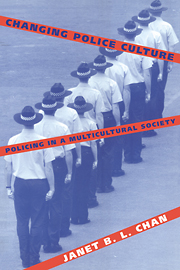Book contents
- Frontmatter
- Contents
- List of Figures
- List of Tables
- Acknowledgements
- Abbreviations
- Introduction
- 1 Policing in a Multicultural Society
- 2 Discrimination and Police Work
- 3 Strategies for Change
- 4 Re-examining Police Culture
- 5 Police and Minorities in New South Wales
- 6 Under New Management
- 7 Ethnic Affairs Policy Statement: The Paper Chase
- 8 Cop It Sweet: Reform by Media
- 9 Processes and Outcomes of Change
- 10 Changing Police Culture
- Bibliography of Works Cited
- Index
4 - Re-examining Police Culture
Published online by Cambridge University Press: 04 November 2009
- Frontmatter
- Contents
- List of Figures
- List of Tables
- Acknowledgements
- Abbreviations
- Introduction
- 1 Policing in a Multicultural Society
- 2 Discrimination and Police Work
- 3 Strategies for Change
- 4 Re-examining Police Culture
- 5 Police and Minorities in New South Wales
- 6 Under New Management
- 7 Ethnic Affairs Policy Statement: The Paper Chase
- 8 Cop It Sweet: Reform by Media
- 9 Processes and Outcomes of Change
- 10 Changing Police Culture
- Bibliography of Works Cited
- Index
Summary
It was argued in the last chapter that the debate about how police should be reformed – whether through law reform or cultural change – has been stymied by an inadequately theorised notion of police culture. The purpose of this chapter is to identify the weaknesses of the current theories and demonstrate a more fruitful approach. I will begin with a general critique of the traditional formulation of the concept, and then go on to discuss how police culture can be reconceptualised to provide more useful answers to questions such as why reforms often make little difference to police practice. The reconstructed framework makes use of a cognitive model of culture, while adopting Pierre Bourdieu's concepts of ‘field’ and ‘habitus’ to represent the structural conditions of policing and the learned dispositions of police culture respectively. Central to this formulation is the active role played by police actors, who develop a certain ‘practical consciousness’ (Giddens 1984) in relation to a given set of working conditions. The final section of this chapter explains how this framework applies to the relations between police and visible minorities in Australia and discusses its implications.
Problems with Current Theories
There are four major criticisms of the way police culture has been conceptualised. In spite of Reiner's acknowledgement that the ‘cop culture’ is not ‘monolithic, universal nor unchanging’ (Reiner 1992: 109), police culture is often described as though it is. Indeed, the first criticism concerns the failure of existing definitions of police culture to account for internal differentiation and jurisdictional differences.
- Type
- Chapter
- Information
- Changing Police CulturePolicing in a Multicultural Society, pp. 65 - 93Publisher: Cambridge University PressPrint publication year: 1997



